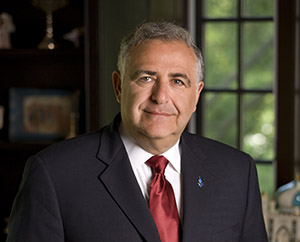
He saved perhaps the most important piece of information for last.
Richard Joel, in an email to Yeshiva University staff, students and alumni, announced near the letter’s end that he would not seek a future contract when his current agreement ends in 2018.
“I just celebrated my 65th birthday,” Joel wrote. “I am well into my 13th year of the presidency and the 28th year of leading Jewish educational institutions. When I accepted a third term as president, I informed our chair, Henry Kressel that it would be my last. As we now are poised to advance, I have asked chairman Moshael Straus to begin the process of transition and to identify and recruit my successor. This wonderful and committed lay leadership deserves to have the time to be deliberate in that process.”
Joel, in an interview with the Jewish Link, said “I’m in the 12th-and-a-half year of a 15-year agreement. I don’t know why it’s a big deal. I wanted the board to start thinking transition and succession. I knew how long it took for them to get me.”
The president started his e-mail announcing the newly signed deal transferring the operations and the finances of YU’s Albert Einstein College of Medicine to the Bronx-based Montefiore Health Systems.
The letter also contained other points of good news and progress for YU, including a $15 million gift from Mordecai and Dr. Monique Katz, which raises their total gift to the Capital Campaign to $25 million. The funds will help launch a new School of General Studies and Continuing Education.
Joel wrote that YU received an anonymous $1 million gift to serve as a challenge gift for increases in the Annual Fund campaign. Also he wrote that net undergraduate tuition revenue has increased nearly $6 million in two years.
His tenure, however, was marred, at times, especially in terms of YU’s financial stability. It was in 2008 when the school endured significant losses due to the impact of the Bernie Madoff Ponzi scheme. The school has endured financial losses despite the sale of $72.5 million of real estate and reductions in staff.
Yeshiva University also endured a downgrade in its credit rating. Moody’s warned the school that it could run out of money before it could take care of its deficits. It was just last March when the school’s undergraduate faculty passed a nonbinding vote of no confidence in Joel. The YU Board supported him, however, bringing in the firm of Alvarez and Marsal to create and implement a strategic financial plan.
But the news wasn’t always bleak. Joel launched YU’s Strategic Planning and Restructuring Implementation Team towards academic and operational improvements.
YU’s faculty is larger, better paid and includes more tenured positions than when he took over in 2003, Joel said.
He also led the construction of the Jacob and Dreizel Glueck Center for Jewish Study, which opened in 2009. Joel also started new centers that strengthened YU’s ties to the Orthodox community. They include the Center for the Jewish Future and Center for Ethics and the Center for Israel Studies.
“I didn’t want to be president beyond this term,” he said. “I’m concerned about YU. We’ve done a turnaround. Institutions need renewal, a new act in them. But there’s a lot of time between now and emeritus and whatever they do with dead presidents.”
“I’ll miss the sanctity of this job,” he continued. “I’ll miss the people I encounter every day.”
Joel added that Yeshiva University is “in a good place now.”
“There are still financial challenges,” he said. But we’ve done a turnaround, and God and philanthropists have been very good to us. Yeshiva University is alive and it is well.”
Joel, who has eight grandchildren, said he does hope to spend time with them. But he added that he’s a tenured faculty member and fully intends to teach after he leaves the presidency.
“I’ve given the university a long runway,” he said about his stepping down.
When interviewed by the Link last March, he was asked how he would grade himself as a university president. The answer was and still is “an incomplete.”
“I haven’t finished building a legacy,” he said. “But my grade is an incomplete. I’m not done.”
As far as the sometimes negative news he’s received whether on campus or in the media, Joel said it is something he won’t miss “one iota. It’s so unfair to fall into the mouths of small people. I know I’m far from perfect, but some of the reports were just hurtful.”
“But the Einstein deal is a win-win,” he continued. “The turnaround and structure of the Yeshiva is a win. The $15 million is a big deal. Bringing the faculties together is a win. We are alive and healthy.”












